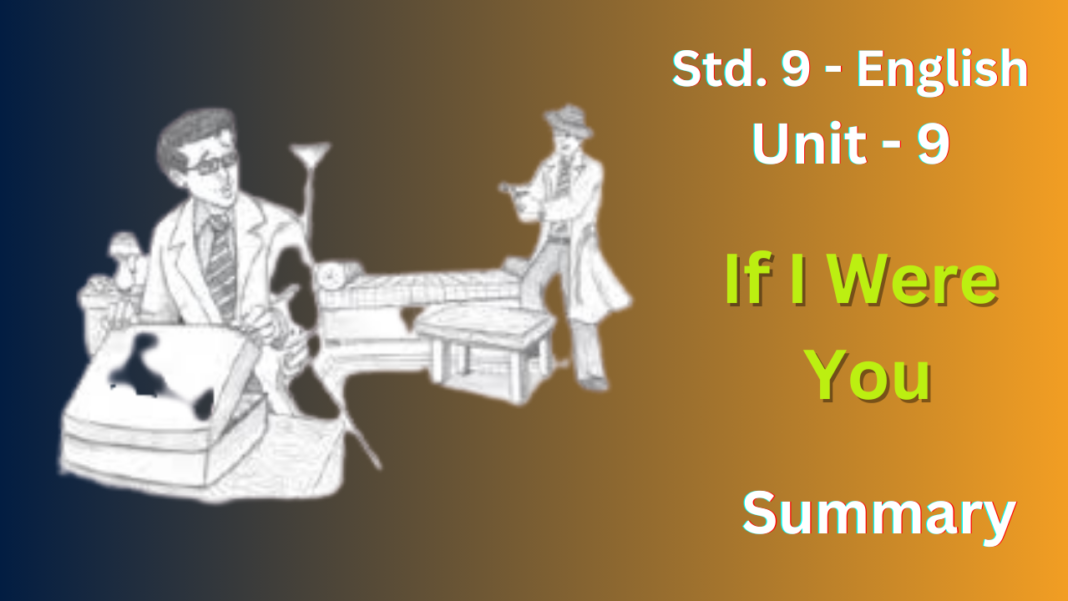If I Were You
The chapter “If I Were You” by Douglas James is a dramatic story about a clever playwright named Gerrard who outsmarts a murderous intruder. Here’s a summary:
- Intruder’s Motive: A criminal breaks into Gerrard’s house, intending to kill him, steal his identity, and disappear.
- Gerrard’s Surprise: The intruder expects Gerrard to be an easy target, but Gerrard reveals he’s actually aware of the intruder’s plan.
- False Identity Twist: Gerrard shocks the intruder by claiming he himself is a criminal on the run.
- Confrontation and Deception: Gerrard uses his wit and knowledge of psychology to convince the intruder that impersonating him wouldn’t be safe.
- Resolution: Gerrard outsmarts the intruder, trapping him in a cupboard and calling the police.
Key Points:
- The story emphasizes the importance of wit and resourcefulness in difficult situations.
- Gerrard’s quick thinking and knowledge of human behavior save him from a dangerous situation.
- The playfulness of the title “If I Were You” reflects the central theme of assuming another’s identity.
I. Answer these questions.
1. At last a sympathetic audience.”
- Who says this?
- Why does he say it?
- is he sarcastic or serious?
Ans :
Who says this?
Gerrard, the homeowner, says the line “At last a sympathetic audience.”
Why does he say it?
The intruder has just demanded Gerrard sit down and talk about himself.
Is he sarcastic or serious?
Gerrard is definitely being sarcastic. The intruder’s behavior is threatening, not sympathetic. Gerrard uses sarcasm to mock the intruder’s pretense of friendliness.
2. Why does the intruder choose Gerrard as the man whose identity he wants to take on?
Ans : The intruder chose Gerrard as the person whose identity he wants to assume because Gerrard is somewhat of a mystery man. He places his orders over the phone and sometimes leaves suddenly, only to return just as abruptly.
3. “I said it with bullets.”
- Who says this?
- What does it mean?
- Is it the truth? What is the speaker’s reason for saying this?
Ans :
Who says this?
This line is spoken by the character Gerrard in the play “If I Were You” by Douglas James.
What does it mean?
On the surface, it suggests Gerrard used a gun (“bullets”) to forcefully communicate something in the past, perhaps escaping a dangerous situation by shooting someone.
Is it the truth?
No, it’s most likely a bluff.
Speaker’s reason for saying this?
Gerrard is in a tense situation with an intruder who has a gun. He’s trying to deceive the intruder into thinking he’s a dangerous person who won’t hesitate to use violence. This is a tactic to scare the intruder and hopefully avoid being shot himself.
4. What is Gerrard’s profession? Quote the parts of the play that support your answer.
Ans : Sorry I can’t let you have the props in time for rehearsal
5. “You’ll soon stop being smart.”
- Who says this?
- Why does the speaker say it?
- What according to the speaker will stop Gerrard from being smart?
Ans :
1. Said by the intruder.
2. He says this because Gerrard doesn’t appear to be afraid of his gun at all.
3. According to the speaker, the bullet will put an end to Gerrard’s cleverness.
6. “They can’t hang me twice.”
- Who says this?
- Why does the speaker say it?
Ans :
1. spoken by the intruder.
2. The speaker says this because he intends to murder Gerrard. Having already committed one murder, he believes the police cannot execute him twice.
7. “A mystery I propose to explain.” What is the mystery the speaker proposes to explain?
Ans : “A mystery I propose to explain” is a clever bluff by Gerrard, not a genuine offer to solve an actual mystery.
8. “This is your big surprise.”
- Where has this been said in the play?
- What is the surprise?
Ans :
1. Gerrard says this line. He tells the intruder that if he isn’t hanged for Gerrard’s murder, he will certainly be hanged as Vincent Charles Gerrard. He utters these words at that moment.
2. The big surprise is that Gerrard won’t be killed by him. He is correct in saying this.
Thinking about language
1. Consult your dictionary and choose the correct word from the pairs given in brackets.
- The (site, cite) of the accident was (ghastly/ghostly).
- Our college (principle/principal) is very strict.
- I studied (continuously/continually) for eight hours.
- The fog had an adverse (affect/effect) on the traffic.
- Cezanne, the famous French painter, was a brilliant (artist/artiste).
- The book that you gave me yesterday is an extraordinary (collage/college) of science fiction and mystery.
- Our school will (host/hoist) an exhibition on cruelty to animals and wildlife conservation.
- Screw the lid tightly onto the top of the bottle and (shake/shape) well before using the contents.
Ans :
- Site , ghastly
- Principal
- Continuously
- Effect
- Artist
- Collage
- Host
- Shake
2. Irony is when we say one thing but mean another, usually the opposite of what we say. When someone makes a mistake and you say, “Oh ! that was clever !” that is irony. You’re saying ‘clever’ to mean ‘not clever’.
Expressions we often use in an ironic fashion are:
- Oh, wasn’t that clever!/Oh that was clever!
- You have been a great help, I must say!
- You’ve got yourself into a lovely mess, haven’t you?
- Oh, very funny !/How funny!
We use a slightly different tone of voice when we use these words ironically. Read the play carefully and find the words and expressions Gerrard uses in an ironic way. Then say what these expressions really mean. Two examples have been given below.
Write down three more such expressions along with what they really mean.
| What the author says | What he means |
| Why, this is a surprise, Mr— er— | He pretends that the intruder is a social visitor whom he is welcoming. In this way he hides his fear. |
| At last a sympathetic audience! | He pretends that the intruder wants to listen to him, whereas actually the intruder wants to find out information for his own use. |
Ans :
| What the author says | What he means |
| 1. At last a sympathetic audience! | Gerrard means that his company is not a sympathetic audience because the intruder has got a gun in his hand. |
| 2. You have been so modest. | Gerrard means that the intruder has been immodest in not having told anything about himself. |
| 3. With you figuring so largely in it, that is understandable | Gerrard means that it is not understandable how anything about him is ‘surprising’. |
Dictionary use
A word can mean different things in different contexts. Look at these three sentences:
- The students are taught to respect different cultures.
- The school is organising a cultural show.
- His voice is cultured.
In the first sentence, ‘culture’ (noun) means way of life ; in the second, ‘cultural’ (adjective) means connected with art, literature and music ; and in the third, ‘cultured’ (verb) means sophisticated, well-mannered. Usually a dictionary helps you identify the right meaning by giving you signposts.
…………………………………………………………….
…………………………………………………………….
Look up the dictionary entries for the words sympathy, familiarity, comfort, care, and surprise. Use the information given in the dictionary and complete the table.
| Noun | Adjective | Adverb | Verb | Meaning |
| sympathy familiarity comfort care surprise |
Answer:
| Noun | Adjective | Adverb | Verb | Meaning |
| sympathy | sympathetic | sympathetically | sympathize | Sharing the feelings of someone else, especially when they are going through a difficult time. |
| familiarity | familiar | familiarly | familiarize | Having or showing knowledge or experience of something or someone. |
| comfort | comfortable | comfortably | comfort | A feeling of peace or happiness; to make someone feel less worried or upset. |
| care | care | carefully | care | To feel concern about someone or something; to look after someone or something. |
| surprise | surprise | surprisingly | surprise | A feeling of shock or wonder caused by something that is not expected; to cause someone to feel shock or wonder. |
Speaking
1. Imagine you are Gerrard. Tell your friend what happened when the Intruder broke into your house.
[Clues: Describe (i) the Intruder—his appearance, the way he spoke, his plan, his movements, etc., (ii) how you outwitted him.
Ans : You won’t believe the night I had! I was on the phone, minding my own business, when all of a sudden the back door bursts open. This rough-looking guy, all nervous energy and a twitchy eye, barges in with a gun pointed straight at me. He was muttering under his breath, a real bundle of nerves.
Turns out, he wasn’t after my valuables – he wanted my entire life! He planned to kill me, steal my identity (apparently Vincent Charles Gerrard is a real charmer!), and disappear. Not on my watch!
2. Enact the play in the class. Pay special attention to words given in italics before a dialogue. These words will tell you whether the dialogue has to be said in a happy, sarcastic or ironic tone and how the characters move and what they do as they speak. Read these carefully before you enact the play.
Ans :
(Door bursts open. Intruder enters, gun pointed at Gerrard.)
Intruder: Don’t move!
Gerrard: (Calmly) Now, now, is there a problem? (Looks around) Did you forget something?
Intruder: Robbery! Where are the valuables?
Gerrard: (Chuckles) A writer’s abode, not a bank. Unless you like dusty silver and spiders. (Raises an eyebrow)
Intruder: (Confused) I… need your life. Your house. Everything.
Gerrard: (Intrigued) My life? Fascinating! (Taps chest) Why Vincent Charles Gerrard? The charm?
(Intruder stares silently.)
Gerrard: (Pats pockets) Inconveniences come with this life. (Taps phone) Parking tickets and an ex-wife.
Intruder: (Panicked) No!
Gerrard: (Pats Intruder’s shoulder) Maybe a life on the run is what you need. (Walks to a dusty wardrobe.)
Gerrard: (Cont.) Hidden passage behind this very wardrobe. Escape route! Freedom awaits!
(Pushes Intruder towards wardrobe. Slams it shut and locks it.)
Gerrard: (Picks up phone, never disconnected) Sergeant? You won’t believe the surprise I have for you…
Writing
1. Which of the words below describe Gerrard and which describe the Intruder?
smart humorous clever
beautiful cool confident
flashy witty nonchalant
Ans :
Gerrard was smart, humorous, confident, witty, and clever. He remained calm under pressure. When the intruder broke into his cottage, he maintained his composure and confidence. He quickly devised a story, convinced the intruder, and successfully got rid of him, showcasing his intelligence and presence of mind. He was also nonchalant.
The intruder was smart, attractive, flashy, clever, and confident. He gathered extensive information about Gerrard and meticulously planned his visit. He wore flashy clothes and had the ability to instill fear in others. Additionally, he was witty, answering Gerrard’s questions intelligently and sarcastically.
2. Convert the play into a story (150-200 words). Your story should be as exciting and as witty as the play. Provide a suitable title to it. ‘Intelligence is powerful than strength’.
Ans :
Gerrard, a playwright lost in a phone call, was startled by a bang and a shaky voice demanding valuables. Glancing up, he saw a nervous intruder brandishing a gun.
“Whoa there,” Gerrard drawled, “wrong kind of abode, mate. More dusty manuscripts than diamonds.”
The intruder, confused, stammered, “I… I need your life.”
Gerrard, ever the wit, feigned concern. “My life? Parking tickets and a vengeful ex-wife aren’t exactly glamorous.” He gestured to a dusty wardrobe. “Speaking of escape routes, there’s a secret passage behind there.”
The intruder, desperate, lunged towards the wardrobe. Gerrard slammed it shut and locked it with a dramatic flourish. His phone, miraculously still connected, went to his ear.
“Sergeant? You won’t believe the surprise I have waiting…” A muffled thump echoed from within the wardrobe as Gerrard grinned. Intelligence, it seemed, was a far more effective weapon than a gun.









